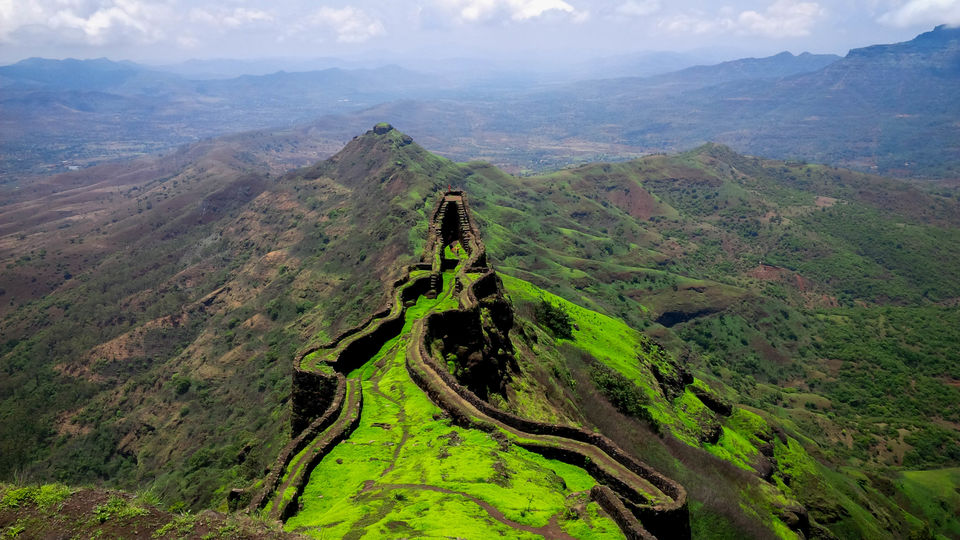The Western Ghats in Maharashtra, located in the western part of India, unravel an exquisite beauty that is unmatched. This mountain range stretches over 1,600 kilometers from the state of Gujarat to the southern tip of India and covers an area of around 140,000 square kilometers. These majestic hills, declared a UNESCO World Heritage Site, are heaven for trekkers and nature enthusiasts. Maharashtra, a state blessed with an incredible diversity of flora and fauna, offers numerous trekking routes through the Western Ghats that offer breathtaking views and unforgettable experiences.
One of the most renowned and popular trekking routes in Maharashtra is the Sahyadri Range, which forms a part of the Western Ghats. Sahyadri, meaning “Benevolent Mountains,” is a treasure trove of natural beauty and historical significance. This range is dotted with several forts and ancient caves that add an element of mystique and charm to the treks. These forts, built by various rulers throughout history, hold tales of valor and bravery and serve as a window into the past.
One such trek that stands out among adventure enthusiasts is the Rajmachi Trek. Nestled amidst the Sahyadri Range, Rajmachi is a small village located near Lonavala, a hill station famous for its lush greenery and cascading waterfalls. The trek to Rajmachi starts from the base village of Udhewadi and offers a moderate level of difficulty, perfect for beginners and experienced trekkers alike.
As the trek begins, a dense forest engulfs the trail, providing a cool respite from the scorching sun. The path meanders through thick foliage, tall trees, and winding routes, captivating trekkers with its ethereal beauty. The chirping of birds, rustling of leaves, and the occasional sighting of playful monkeys create a symphony of sounds that merge with the tranquility of the surroundings.
More: Wanted to download Odisha Magazines, visit here
After a couple of hours of trekking, a small waterfall emerges on the trail, inviting weary trekkers to take a refreshing dip. This natural oasis rejuvenates the body and soul, leaving trekkers re-energized for the remaining journey. Moving forward, the path leads to a ridge with a panoramic view of the valley below. The sight of clouds floating below eye level is a surreal experience that leaves trekkers awe-inspired.
Gradually, the trail takes trekkers to the famous Rajmachi Fort, perched atop a hill. This ancient fort, constructed in the 17th century, served as a strategic vantage point for the Maratha Empire. The fort’s ruins still stand tall, offering a glimpse into the past and creating a hauntingly captivating atmosphere. The sunset from the top of the fort is breathtaking, painting the sky with hues of orange, pink, and gold. As darkness sets in, the twinkling stars decorate the sky, allowing trekkers to witness the beauty of the night sky away from the city lights.
Apart from the Rajmachi Trek, Maharashtra offers several other exhilarating treks through the Western Ghats. The Harishchandragad Trek, located in the Ahmednagar district, is renowned for its rock-cut caves and the famous Konkan Kada cliff, which offers a vertigo-inducing view of the surrounding valleys. The Kalsubai Trek, near the Bhandardara hill station, takes trekkers to the highest peak in Maharashtra, providing breathtaking views of the vast expanse below. The Lohagad Trek, near Lonavala, is favored by history buffs as it leads to an ancient fort known for its architectural brilliance and historical significance.
For those seeking a deeper connection with nature, the treks through the Western Ghats offer unique opportunities to explore the rich biodiversity of Maharashtra. The Ghats are home to several endemic species of flora and fauna, including the Malabar giant squirrel, the Nilgiri langur, and various species of orchids and carnivorous plants. The treks provide an up-close encounter with these rare species, leaving trekkers enlightened and more appreciative of the delicate balance of the ecosystem.
In conclusion, trekking through the Western Ghats of Maharashtra is an unparalleled experience that offers a perfect blend of natural beauty, historical significance, and adventure. The Sahyadri Range unfolds breathtaking vistas that captivate the senses and leave trekkers with memories to cherish for a lifetime. The moderate difficulty levels make these treks accessible to people of all age groups, ensuring that everyone can partake in the spellbinding journey. So, pack your bags, lace up your shoes, and embark on a trek through the Western Ghats in Maharashtra for an experience that will leave you enchanted and yearning for more.
FAQ For Trek Through The Western Ghats in Maharashtra
What is the Western Ghats?
The Western Ghats is a mountain range that runs parallel to the western coast of India. It is recognized as a UNESCO World Heritage Site and is one of the eight “hottest hotspots” of biodiversity in the world.
Where is Maharashtra’s Western Ghats located?
Maharashtra’s Western Ghats is located in the western part of the state, extending over a length of approximately 600 km. It covers areas such as Pune, Mumbai, Nashik, Kolhapur, and Satara.
What are some popular trekking routes in the Western Ghats of Maharashtra?
Some of the popular trekking routes in Maharashtra’s Western Ghats include Rajmachi Fort Trek, Sinhagad Fort Trek, Kalsubai Peak Trek, Harishchandragad Trek, and Lohagad Fort Trek.
When is the best time to trek through the Western Ghats in Maharashtra?
The best time to trek through the Western Ghats in Maharashtra is during the post-monsoon and winter seasons, which typically span from September to February. The weather during these months is pleasant, with clear skies and cooler temperatures.
What are some essential items to carry while trekking through the Western Ghats?
Some essential items to carry while trekking through the Western Ghats include sturdy trekking shoes, comfortable clothing, sunscreen, insect repellent, a hat, a water bottle, a first aid kit, a map or compass, and a backpack to carry your belongings.

